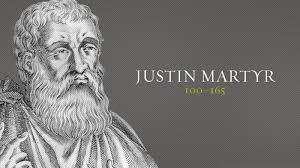Saint Justin, who is called the ‘martyr’, was born around the time the last Apostle, John, departed this life for heaven. Justin was not raised in the Catholic faith – few were in those incipient days – but was rather a pagan convert to Christianity. He first investigated the various philosophies of the age, Platonism, Socratic, Peripatetic, Stoic, Pythagorean, but none satisfied his desire for the ‘whole truth and nothing but…’.
It was a chance meeting with an old man, a Syrian Christian, who offered him the simplicity and coherence of the Catholicism, which satisfied Justin’s desire for truth and beauty, and his mind and soul were made up. It is from Justin’s pen that we have one of the earliest descriptions of the Holy Mass, in a letter to Antoninus Pius in around 155 A.D. (cf., CCC, #1345).
Justin adopted the life of an itinerant teacher, eventually starting a school in Rome, writing much, but what survives are two dialogues and an ‘apology’; hence is called the first of the ‘apologists’, those who made a ‘reasoned defence’ of the faith, as Saint Peter exhorted us to do (1 Pet 3:15).
Justin was sort of a precursor of the doctrine clarified at the Second Vatican Council that the truth is dispersed throughout history like seeds, and that anyone who follows the truth, as it is known to them – even the pagan philosophers of old – could be considered an ‘unwitting’ Christian. Salvation really is open to all, although easier with the more truth that one has.
Yet, as we have seen in our own current House of Parliament, some seem blinded to the truth, perhaps deliberately so, shutting their eyes and ears so they cannot – or will not – see and hear. After a dispute with the cynic philosopher Crescens, Saint Justin was denounced to the authorities, and beheaded in 165 A.D., under the persecution of the Stoic emperor Marcus Aurelius.
The contemporary account of Justin’s trial and martyrdom makes for some visceral reading, to witness for the truth. Contrary to the ambiguous message of works like Silence, Saint Justin declared that he had no need to deliberate on whether to offer sacrifice to false gods, regardless of what inducements they offered, and that he would never give up his Faith. He knew that philosophy has its limits, and that the Faith is more certain than any human science. Justin’s loss of this temporal life, giving all, even his very mind, to Christ, meant that he received it all back, a hundredfold.
So have confidence, be of good cheer, and be not seduced by the world and its arguments. For like its form, they too are passing away, but the truth abides forever.
May Saint Justin intercede for our eponymous Prime Minister, that he may see the truth to which is blinded, and for all of us, that we may follow more faithfully what truth we are given the grace to see.


